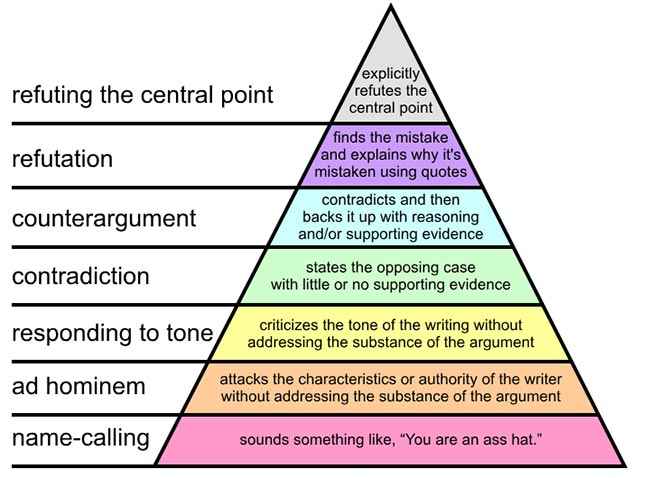How logical fallacies are used to sell stuff to you

Not used just in online arguments, logical fallacies can be used to market stuff to you. Find out how to avoid falling for them.
Albert Einstein once said that insanity was doing the same thing over and again and expecting different results, but what he didn’t realise is that most of us normal people fall into that category. We all have our comfort zones, our habits, and yes, even our biases, and it all adds up to us making the same mistakes over and over again. Whether it’s being a fanboy for a product, not learning from past mistakes when making impulse purchases, always shopping from the same online store despite knowing others may be cheaper… we constantly do things that may not work out to be the best decision in the long run.
Anyone who has been in a serious argument online (and that’s almost everyone on social media these days), will be aware of the logical fallacies that people use to support their arguments. Even if you didn’t know that they were called “logical fallacies”, you will still recognise the fallacies we list here, because they’re so common.
Now if you think those first two paragraphs just don’t link together at all… that’s what this third paragraph is for… Making use of our biases and using logical fallacies to do so is what marketing gurus do best. Some very smart people are paid a lot of money to take advantage of our inbuilt flaws, and sell us products at prices that are exorbitant. However, it’s not just companies who are doing this, it’s other users as well, especially fanboys, and the shocking thing is that, unlike companies, they do so for no personal benefit at all. Heck, you might be guilty of doing the same yourself! We hope this article can help you spot these fallacies when you see them, and not just point them out, but stop committing them yourself.
Ad Hominem
The ad hominem fallacy, which translates from Latin to “against the man”, is pretty straightforward. It’s an act of attacking a person’s character, instead of responding to an argument made by the person. More often than not, this fallacy is used in arguments along with some of the others that will follow it in this article.
Ad hominem falls pretty low on the hierarchy of disagreement
In the tech world, you will come across this more from people you argue against. For example, when people used to debate Windows vs. Linux, a common argument against Windows was that it made Bill Gates rich, or that he stole some idea from someone, or something along those lines, which had absolutely nothing to do with whether Windows was better or Linux. Sometimes companies also use ad hominems against each other. They’re usually as snarky ads, even going as far as making fun of each other’s user base! When no one really has anything truly better to show off, you end up with such tactics.
Strawman
This is usually a tactic used in an argument where a person builds up a flawed argument on behalf of an opponent, and then proceeds to counter it and point out the flaw, thereby giving people the illusion that he/she is victorious. Think of it as erecting a dummy of your opponent, made of straw, and then proceeding to beat the stuffing out of it, and then claiming to have bested them in a fight.
This is the most common type of argument used by fanboys when arguing on two different sides of a tech debate. For example, you could say, “I love using WhatsApp and staying in touch with my school friends”, to which someone could respond, “But Facebook owns WhatsApp and is used for fake news. So you’re OK supporting a company that spreads the fake news? I’m not, that’s why I use Telegram.”
Halo Effect
When one trait of a person or thing is used to make an overall judgment of that person or thing. For technology, this is usually a case of perception; for example, a company might leverage its expertise in one field to falsely claim expertise in another. Sometimes this is not something a company does, it’s something users do all on their own. Fanboyism in any form is usually caused by the halo effect, and these days, we’ve got fanboyism pretty much everywhere!
A classic example was the success of the iPod boosting sales of Macs and other Apple products. Because the iPod was considered “cool” suddenly the general public thought (and to a large extent, still do think) that all Apple products were cool. To be clear, we’re not saying that Apple products aren’t good, because they obviously are, and are perfect for a lot of people… however, unless a user has truly weighed pros and cons of products available, and has informed himself/herself about other brands, they really are just falling for the Halo effect.
Causal Fallacy (Slippery slope, post hoc, etc)
Usually, a slippery slope is a fallacy that’s used negatively, while a causal fallacy is something that can be both positive or negative. The fallacy here is to draw conclusions from one event and wildly extrapolate them to a different event.
- Slippery slope: This is where a small incident or even hypothetical scenario is then followed by more hypothetical scenarios, and the fallacy is completed when extrapolated to some extreme scenario. “If you buy a Chinese-made phone, China gets richer, they pollute the environment more, global warming occurs, and then we have acid rain in India!”.
- Post hoc ergo propter hoc: Just post hoc fallacy for short, this literally translates from Latin to “after this, thus because of this”. The fallacy here is to equate an event as the cause of something else. This can be used both negatively and positively and is more often than not used positively in marketing by companies. For example, adventurous men doing all sorts of extreme sports and then drinking a soft drink before or after their shenanigans is a subtle way of using the post hoc fallacy to equate an adventurous spirit with their product.
- Cum hoc ergo propter hoc: This translates to “with this thus because of this”. The idea here is to find two things that occur together, and then use that to assume causation. This is often used a lot to misrepresent a bogus position as scientific or to just create links that are tenuous at best. An example would be, “95% of school toppers who own a smartphone, have Android phones” (This isn’t true, we just made that up) The fallacy here is to slyly propose that the Android OS has anything to do with intelligence. (It doesn’t, and neither does Apple. Relating any OS to intelligence is a fallacy.)
Appeal to Authority
This one is pretty simple, it suggests that a person of repute or respect should be listened to without a demand for evidence. Now, usually, it’s actually a good idea to cite authorities when arguing, but to do so without presenting their evidence, or to do so by presenting an authority that has nothing to do with the field, or even to present people of questionable authority… are all examples of the appeal to authority fallacy.
An extremely common example is “9 out of 10 dentists agree that…” when advertising a toothpaste. Now, given that this is a tactic used by more than one toothpaste brand, it’s easy to tell that everyone is lying. Yet it is an appeal to authority to get a dentist to recommend a toothpaste. The same for medications and doctors, and so on.
9 out of 10 dentists want to sell you a toothpaste
Then there’s the completely disjointed authority – a film star advertising a water purifier. This is fine, and there’s nothing wrong with it, but people should understand that film stars are just as ignorant about the techniques of water purification as we are, and are just reading lines fed to them. This goes for all products and all product categories.
This can even be used to falsely advertise by using actual authorities. For example, you could use a Formula 1 designer to talk about the technology in a road car by the same brand. Sure, they’re experts in the field, but they’re hardly what you would call an unbiased source. Is it possible their claims are true? Sure, but isn’t it better to just get your information from a truly unbiased source? For technology, that would be people like us at Digit, because we honestly don’t care if Apple or Samsung wins the best phone of the year title, because either way we get to review both, and we can only be of use to you readers (our customers) if we remain totally unbiased.
Tu Quoque
Translating to “you too”, this fallacy basically focuses on hypocrisy and ignores the point being made. So for example, if a fat person were to say “exercise is good for health and controls weight”, a tu quoque fallacy would be to respond to that by saying, “Well you’re fat, so you are a hypocrite and shouldn’t opine on this matter”. Of course, the person is fat and does not exercise enough to reduce weight, but does that change the reasoning of the argument that exercising does reduce weight for real?
In tech, however, the fallacy is often more me quoque than tu quoque. For example, when Apple launched the iPhone X (pronounced “ten” not “ex”), some people loved the notch, and some hated it. (We still hate it). However, as you can see from the market today, a lot of manufacturers have jumped on to the bandwagon and are offering a similar looking display. Why? Because they assume that the iPhone has established itself as a product that’s high end and good quality, so mimicking it (me too) rubs off some of that goodwill on to their product as well. Of course they will never admit to that, and we hear all sorts of excuses for why a notch is actually better, or how it just increases the screen to bezel ratio (which is just another marketing gimmick, honestly), but we have to point out that had it been a cheap Chinese brand that had done it, no one would rush to copy it, would they?
Sunk Cost
This is a fallacy whereby you fool yourself into valuing the investment you have put into something as opposed to future gains. This is most common for, say, careers, where someone who has put in a decade of work into one career, sticks to it despite job shortages, no growth and no job security, because they place a value on the work and effort they have put in the past, and think that it is just as valuable as future growth.
In technology, this is usually something you do to yourself, but it is also done to you by very smart marketers. Many companies try and invent an entire ecosystem around their products to get you so invested that you cannot ever consider leaving them. Apple is notorious for this but is far from the only company attempting to do this. They just happen to be the most successful, where your chargers are useless for any other brand’s devices, or your connectors. Although Google may be considered as a company that does not do this, it, in fact, is trying to, using the Google assistant, Google Home, Maps, etc, to try and ensure you’re invested in their ecosystem.
This is not going to change, of course, and every company is entitled to try and offer you amazing products to try and trap you in their system, but it’s important that you realise that the attempt is to get you to sink costs, so that you can fool yourself with the sunk costs fallacy later (in case you ever want a change).
False Dichotomy
Although mainly used by politicians in the past, this fallacy is being used increasingly by everyday people who seem to think more in terms of binary than anything else. Examples you might have come across are: “If you don’t love me you must hate me”, which is obviously not the case because we neither love nor hate 99.9999999% of people on the planet! “If you love Android you must hate iOS”. “If you use Windows, you are against Open Source software” etc.
Rarely, a dichotomy is actually all there is, for example, AMD and NVIDIA when it comes to graphics cards, but you can still find the false dichotomy there as well: “NVIDIA has the fastest card, so all AMD cards are inferior”, which is obviously untrue, because for a given budget, often either NVIDIA or AMD cards are the better buy on performance to price ratios.
The “if you’re not with us, then you’re against us” false dichotomy is perhaps the most common one found online now. In terms of technology, these are most often used by fanboys on forums or in discussions, and you should be quick to point them out when they’re thrown at you. To quote Obi-Wan Kenobi, “Only a Sith deals in absolutes!”. Oh wait, that’s a false dichotomy as well… never mind…
Let’s be smarter
There are several dozens of fallacies that have been identified, and they are used by us and against us on a daily basis. The aim of this article was to get you to start thinking about these fallacies, and even others that we have not mentioned here because of space constraints. Once you recognise how to spot a fallacy, you are far less likely to ever be fooled by it, and that, after all, is our job – to prevent you from being fooled as consumers.
Editor’s footnote: We are sure we’ve missed a lot of fallacies here and how they are applied in the tech world, especially in ads. So can you point them out to us? Write in and let us know..









